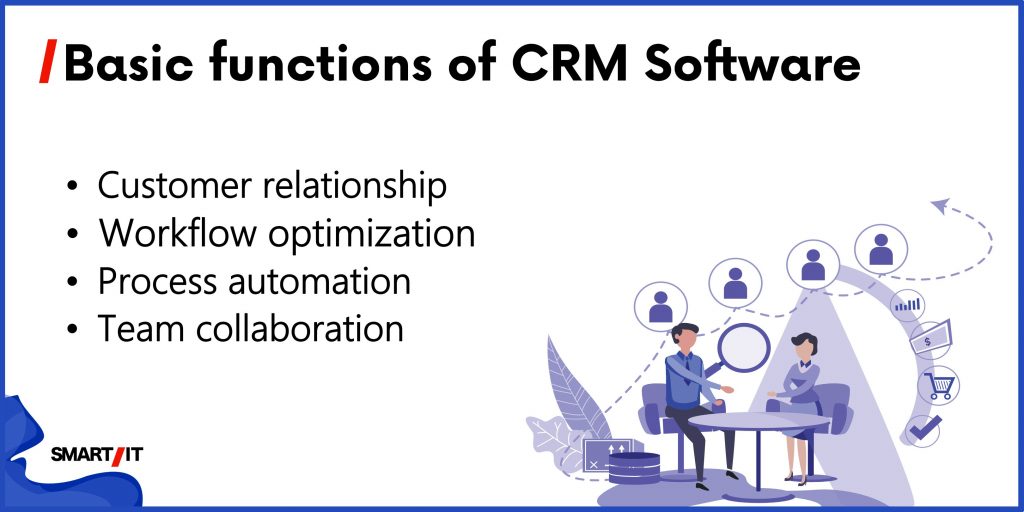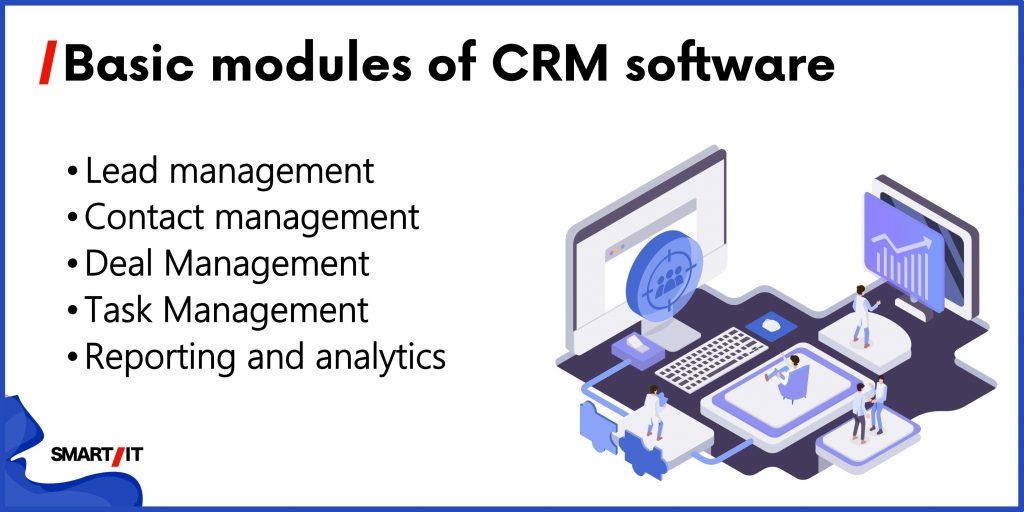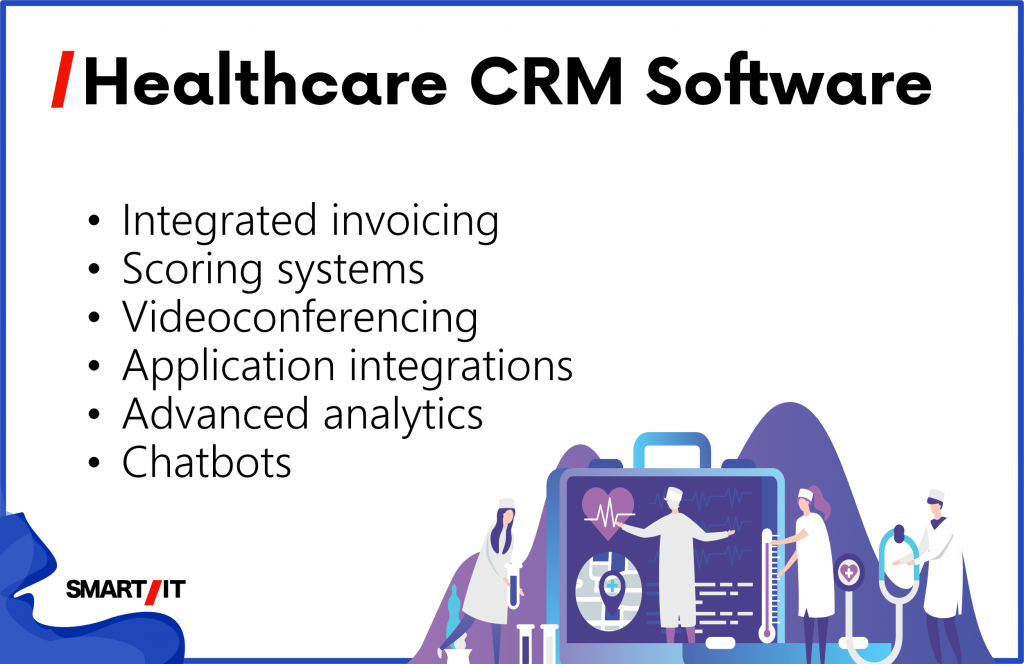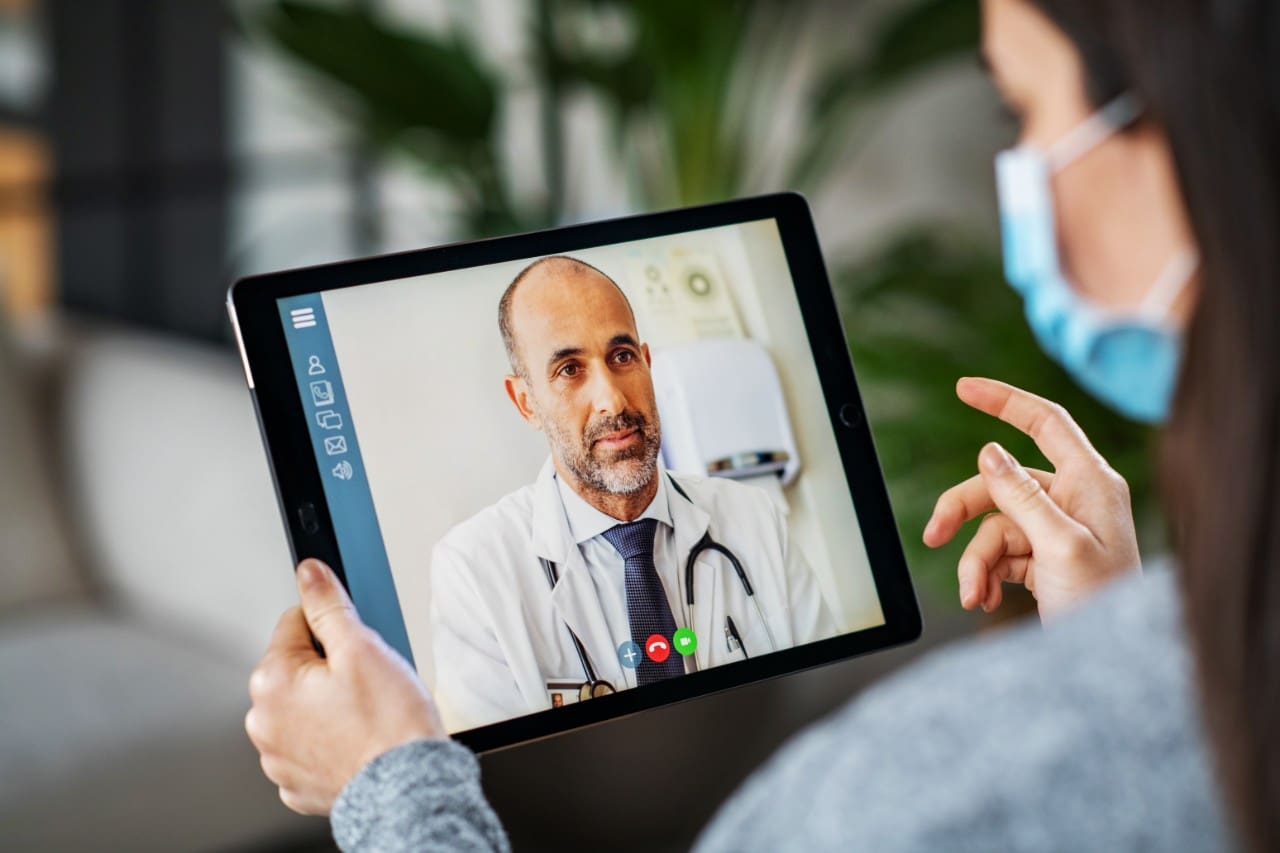Whether they are managing patients or patient related queries and processes, healthcare providers will find themselves working with a large contact base. Like most SMBs and enterprises, healthcare organizations rely heavily on healthcare CRM software to efficiently organize workflow. Which raises the question, do you build a custom healthcare CRM solution or purchase off the shelf?
What is CRM in Healthcare
Customer Relationship Management (CRM) software is a software system that allows users to store and manage information. It can serve different teams working independently or in tandem, help manage interactions with potential leads and paying customers, and serve a myriad of other functions depending on the domain of application.
If you are a healthcare practice struggling to keep records of patient interactions and appointments, schedule preventive screenings, or observe patients over time, it may be time to consider a custom healthcare CRM system.
Basic functions and features of CRM software
In order to understand the benefits that a customer relationship management software can bring to a healthcare provider, it is best to review what a CRM can do in general, regardless of industry.

As the name suggests, a CRM serves the customer relationship management function in an organization. In other words it is a tool used to capture customer information, record interactions with the customer, and schedule tasks.
The software system aids in process automation, whether that is setting follow up tasks, sending notifications, tracking conversations or interactions. The instrument essentially unites what would otherwise be a complex and disparate set of problems, and allows to deal with them from within a single interface.
Moreover, by automating certain routine tasks and organizing processes, a CRM allows for workflow optimization. In turn, this allows for team collaboration. Users can dedicate their time to high-level matters, keeping everything else in order on an individual and departmental level.
Outside of healthcare, CRMs are often used by sales, marketing and customer service teams. In its own right, it helps them put their finger on the customer satisfaction level, which reflects on the company’s revenue and reputation.

A classic CRM softwarewill contain these basic modules:
Lead management — creating a lead profile and logging key lead information
Contact management — higher level contacts; can be paying customers or entire organizations
Deal management — pipeline management and basic invoicing
Task management — includes scheduling, reminders, notifications, pipeline status updates
Reporting and analytics — basic reports based on available or used parameters over a period of time.
Healthcare CRM software
In order to provide the best possible health service and a high level of customer satisfaction, medical practices will rely on dedicated healthcare CRM software.
Hospitals and clinics may require a healthcare CRM solution to simply accomplish patient-related tasks that do not have much to do with treatment and care itself. These can include logging patient contact data and visits, scheduling check-ups and appointments and automating some of the notifications. Without these managing patient records and relationships becomes increasingly difficult.
However, a healthcare CRM can also encompass more than just the basic scope of patient-related tasks. It can essentially supplement or absorb the functions of an Electronic Medical Record (EMR) or Electronic Health Record (EHR).

For that to occur, the software needs to account for additional features. They can include:
Integrated invoicing — a fully supported proposal, invoicing and billing system; can come integrated with payment processors
Scoring systems — scores and indices can be used for behavior ranking and client scoring to assign priority to specific profiles
Videoconferencing — integrated IP telephony with the added benefit of scheduling and executing voice or video calls with contacts; encroaches on telemedicine territory and remote patient monitoring
Application integrations — allows for third party modules to enhance the healthcare CRM software
Advanced analytics — in-depth analysis and customizable reports
Chatbots — virtual assistants, which can interact with leads and contacts through predefined scenarios and conversational models.
Healthcare practices looking to implement an EHR solution or build a comprehensive healthcare CRM solutions from scratch instead need to bear one thing in mind. The UShas a number of standards that govern compliance of EHR/EMR software. To name just two, CEHRT and HIPAA.
Software development companies willing to develop based on standards and ready to undergo the required due diligence and compliance checks will probably be the better pick.
Benefits of a customer relationship management software
To accomplish what they would with a CRM, business organizations used to rely on spreadsheets and word documents. The inconvenience of that approach very quickly became apparent, as the volume of data increased. The switch to a dedicated custom relationship management system proved to increase manageability and allowed them to scale quickly.
Since a CRM takes over many routine tasks, it can also automate customer interaction. If every online patient query were answered by hand, clinic staff would be preoccupied with repetitive actions. Instead, to support clinics visit sign-ups online chatbots can guide the lead on every step of the process.
Studies show that people react well to virtual assistants, even when they know they are being helped by a robot. This is an example of RPA in action.
A robust healthcare CRM software will help manage information security — a must when dealing with protected health information (PHI). It will govern accessibility by dividing access rights into roles and functions, so that only authorized personnel can interact with information they are responsible for or require as part of their duties.
Besides being scalable, a healthcare CRM software can be built to be highly flexible as well. To be more precise, it can feature customizable modules, such as data entry fields, parameters, and dashboards. All of these help make the software more vertical and more fine-tuned for the medical niche it is used in.
Build vs Buy
The decision to buy an out-of-the-box solution versus building one from scratch can be a tough one. On the one hand, healthcare establishments might need to solve a series of immediate problems, so buying seems like the simplest way to go. Software bought, problem closed.
On the other hand, building an entirely new instrument directed at solving very specific problems in a particular line of work might be just what the doctor ordered (pun very much intended).
Granted, healthcare software development from scratch can be a lengthy and expensive endeavor. The scope of work and the number of people and hours involved will drive the cost. At the end of the day, building from scratch might still only cost a fraction of purchasing an enterprise level healthcare CRM.
Enterprise or small business CRMs are built to cover a large user base. They can be tweaked to incorporate different modules to better serve the users in a given domain. Such tweaks normally come with higher premiums, besides the monthly subscription or set costs.
In this regard, a custom healthcare CRM software can be tailored to the needs of the industry it is built for and natively integrated into processes, and not the other way around.
While at first it may seem like that removes the hassle of building a custom system, it also adds the burden of making the tool work for your needs. Since that’s not always easy, companies often end up changing processes around the tool, which conflicts with the idea of purchasing one to solve problems.
If you do end up buying an out-of-the-box solution, bear in mind that in order to align it with your business requirements, coding may still be required. Many enterprise-grade CRM solutions are often designed to be platforms that teams can build upon post-purchase. Essentially, this allows for regular upsale opportunities for the vendor, who still owns the software rights.
When weighing the pros and cons of custom healthcare CRM development, do not forget about data migration. Source data stored in whatever format can easily be integrated into a new system, whereas a pre-built one will most likely have requirements towards the format of the data you want imported.
Moreover, think onboarding. Any new software will require training, be it an OOB solution or a custom one. How long will it take for knowledge transfer on any given solution? Will it be accessible by new hires or those who are transitioning to the new tool? Will it save time or only eat up more of it?
Custom Healthcare CRM Software Development
Building a customer relationship management platform from scratch, in our opinion, holds more advantages over off-the-shelf solutions. By developing a bespoke system, healthcare establishments automatically benefit from controlling their own data. This multiplies benefits across the board, as individual teams within a single unit can then tap into a unified database of information that is integrated across the establishment.
With information under check, medical organizations can focus on improving business processes and the quality of the patient experience using tools developed explicitly with this purpose in mind.
Professionals can can access patient data to study in-depth behavior analytics and gain valuable insights into patient care. Moreover, this opens the door for data-backed research on patients suffering from specific symptoms, allowing for early treatment opportunities and preventive care.
Technology can therefore extend the reach of a medical professional beyond the borders of a hospital or clinic. This comes as a most wanted opportunity, especially during and after a global crisis, with which we all have been faced at the start of the new decade.
Types of Healthcare CRM
Based on the purpose of its use, CRM systems can be divided into three basic categories:
- Analytical (customer data)
- Operational (process automation)
- Collaborative (customer service and teamwork)
The first step towards custom healthcare CRM software development begins with evaluating problems to be solved, objectives to be reached, and goals to be achieved. This will help lean in the right direction, when it comes to picking the type of software you wish to order.
Custom Healthcare CRM integration
Smart IT’s experience with developing and integrating CRM software systems is quite extensive. Pertaining to the healthcare industry, the company’s experience comes in the form of a collaboration with MdBerry.
MDBerry is a New York based HIPAA & ASA compliant medical clinic that prescribes medical marijuana cards through online consultations with authorized healthcare professionals.
One of the key features, developed uniquely for the clinic’s CRM software, which was also built from the ground up, was a web-based videoconferencing component. Patients could therefore seek healthcare advice from a doctor online using an appointment booking system.
As a result of introducing the CRM solution to power its business, MDBerry was not only able extend its coverage online, but also make the foray into several other markets.
Choices, choices, choices
At the end of the day, whatever the choice comes down to, the software solution your healthcare business picks to go with needs to answer to your requests. There is no sense in rushing to pick a software that simply does not cut it for the teams that will be using it.
For those making the call to build or purchase, make sure to survey the personnel that will be using the instrument and heed attention to their pain points. Finding out what your patients are saying could improve the patient experience. Make enough time to think how the work of one team intertwines with another and map out the processes. What will the software tool need to accomplish to be convenient for all teams?
With these and several other points in mind you will be that many steps closer to discovering the healthcare CRM solution that works for your organization. Hopefully, this will be the needed upgrade on the way to improving customer service and resulting in more positive outcomes.
17 April 2020

 Pavel Kaplunou
,
Pavel Kaplunou
, 



